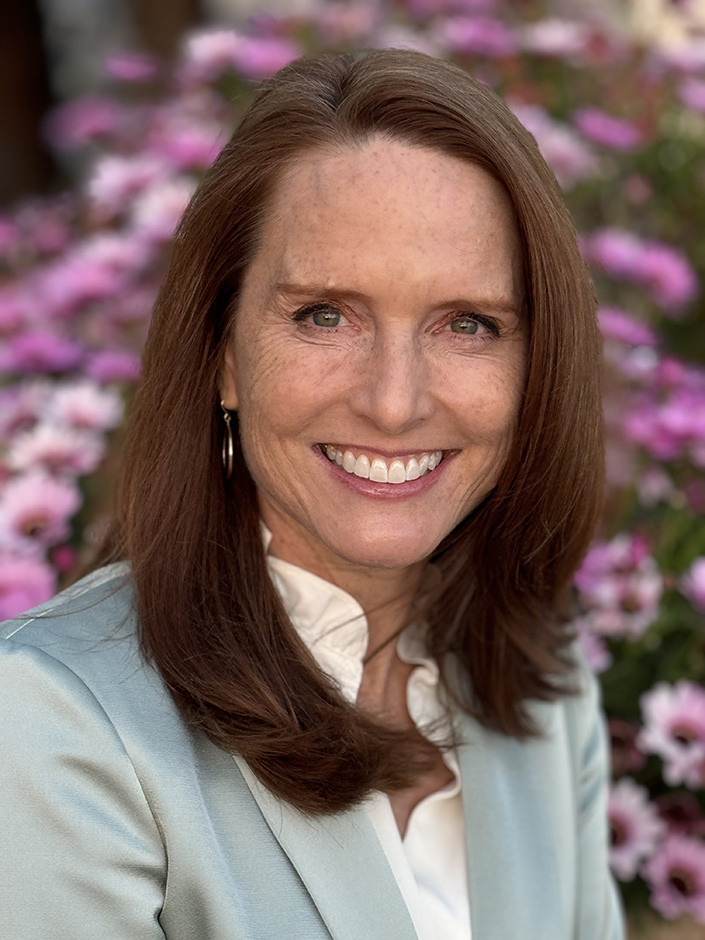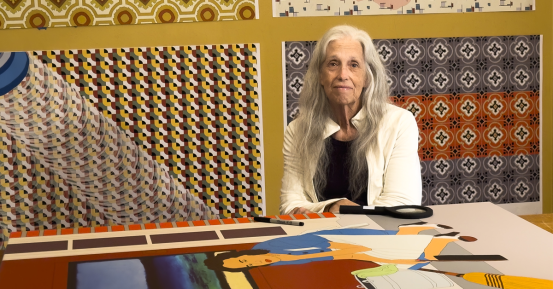Moving Beyond Limits
Counselor Christina Lambert sheds light on neurodivergence and creating a more neuroinclusive workplace
Story by:
Published Date
Article Content
UC San Diego alumna, Christina Lambert, PhD, is a licensed psychologist and counselor for UC San Diego’s Faculty and Staff Assistance Program (FSAP). After spending nearly two decades at the university’s Counseling and Psychological Services (CAPS), Lambert joined the FSAP team two years ago as an employee assistance counselor and to lend her knowledge and experience to making our campus a more welcoming and informed place for campus employees who identify as neurodivergent.
Through her engagement in campus support groups and department presentations, Lambert confirms that there is a real need for this type of programming—perhaps not surprising, given that anywhere from 20-40% of the population is considered neurodivergent. In order to meet the need for support and resources, Lambert brought a wealth of knowledge on neurodiversity and neurodivergence to all campus faculty and staff this spring through a series of virtual workshops timed to Neurodiversity Celebration Week, Autism Acceptance Month and Mental Health Awareness Month.
In an interview with UC San Diego Today, Lambert sheds light on what neurodivergence is, why everyone at the university can benefit from learning more about neurodiversity, misperceptions and some tips for creating a more neuroinclusive workplace.
This interview has been edited for length and clarity.
Could you please share a little bit about yourself?
I was interested in psychology when I was an undergraduate student at UC San Diego, but I knew that a lot of rote memorization and multiple-choice tests, which seemed common in many psychology courses at the time, would not be my strong suit. Although I had not yet been diagnosed with attention-deficit/hyperactivity disorder (ADHD) and dyslexia, I was aware of my cognitive strengths and challenges. Theater had always been my love, so I minored in theater and majored in communication.
I was very involved in campus life initially working in campus dining and then serving as a house (resident) advisor at Muir College, a campus tour guide and as a community service official. After graduating, I was thinking about the Peace Corps, but instead, I arranged for two years of full-time volunteer work. I went to Austin, Texas for a year, where I worked at a shelter for Central American refugees and then to Tijuana for a year, where I taught kindergarten in an orphanage and free English classes in the community. From there, I went to University of San Diego, where I earned a master’s degree with a counselling focus.
While at University of San Diego I worked in multiple departments where I was responsible for social justice and service-learning programming, including alternative break opportunities with a transborder focus. While this was deeply meaningful, I felt that a lot of students were coming to me with concerns outside the depth of my training. As a result, I pursued a doctoral degree at Arizona State in counseling psychology.
I knew I wanted to return to San Diego, so I returned to the university working for CAPS as an intern, postdoc and then joined as staff.
What is neurodiversity?
Simply speaking, neurodiversity refers to the infinite variations in brain functioning among humans—among everyone in our families, our communities and our world. Neurodiversity, the phenomenal collection of unique minds, includes all of us.
What is neurodivergence?
Our understanding of neurodivergence is evolving. In my presentations I mostly focus on ADHD and autism, but neurodivergence can also incorporate sensory processing differences and learning disabilities, such as dyslexia and dysgraphia. As an overarching term for anyone who has a brain that diverges from what is considered typical, neurodivergence can also include bipolar disorder, obsessive-compulsive disorder, epilepsy and Tourette’s syndrome. Of course brain variations are infinite, so this is by no means an exhaustive list.
How did you become interested in the topics of neurodiversity and neurodivergence?
It’s personal and historical for me. I was failing second grade because I could not yet read. I imagine I could have been held back, but fortunately and probably due in part to white privilege, my school tested me and placed me in the gifted program. I was not identified as neurodivergent, as that kind of testing was not widely available in the ‘70s. It was not until much, much later in life that I was diagnosed with ADHD, even though I had long felt it was the case.
I had a lot of anxiety around school. I would lose points on tests because I did not finish in time. Like a lot of ADHDers, my performance issues were interpreted as carelessness, laziness, not applying myself or choosing not to curb my perfectionism. My parents did what they could to help me by reviewing my assignments, hiring a tutor, taking me to a counselor and supporting my extracurricular interests. It was their expectation that I would go to college, so I kept trying.
I’ve learned from my own journey, as well as through the support groups that I run. It is a privilege to be with so many other people who identify as neurodivergent on their journeys. These are my people, and I’ve met some incredible humans who have taught me so much.

Why is this topic important for staff and faculty at the university?
Anywhere from 20-40% of the population is considered neurodivergent, so this is relevant to many faculty and staff in their professional and personal lives. My hope is to promote understanding among a broader university audience. I have had the honor of facilitating support groups for neurodivergent staff as well as providing consultation to faculty and people leaders on working with neurodivergence. Through this experience I have found that people want to learn more about neurodivergence and create a more inclusive environment which capitalizes on diverse cognitive strengths.
As far as neurodiversity in the workplace, we all do better—are happier, more satisfied and more effective—when we are capitalizing on our strengths. Having a productive work life includes learning where we excel, how we work with others and extending grace. One way we can do this is by being mindful of different communication styles—whether due to culture, generation, gender, personality, neurodivergence, etc.—and noticing if we are jumping to conclusions about intent when we feel bothered that a colleague is, for example, interrupting, not making eye contact or is expressing a pointedly direct opinion.
Statistically, neurodivergent employees often tend to feel more stressed, anxious and depressed. One significant factor is that we frequently receive messages—direct and implied—that the way we are in the world is not OK. Especially when left unrecognized and unsupported, cognitive differences can negatively impact people, resulting in stress-induced illnesses, lost productivity, absenteeism, unemployment or underemployment.
Are these kinds of programs and resources typical for faculty and staff assistance programs?
They are not typical. Crystal Green, director of the UC San Diego Faculty and Staff Assistance Program, was forward-thinking in recognizing that this is relevant for our community. She invited me to join the team and focus on neurodivergence, starting with support groups for campus faculty and staff. Many people come in feeling misunderstood at home or in the workplace. Others are struggling to understand someone they love or want to know how to work more collaboratively with colleagues who think, communicate and perform differently than they do. Our programs at FSAP seek to increase belonging and inclusion, which leads to more effectiveness, employee retention and satisfaction in the workplace.
What are common misunderstandings?
Part of the value of the workshop is that it provides the fundamentals around neurodiversity and neurodivergence. People may have heard the words but are not sure what they mean. People also may have certain attributes in mind when they hear terms like autism or ADHD, but like neurotypical people, neurodivergent people are all unique. For example, one autist might communicate literally and have trouble interpreting social cues, body language or figurative language, while another autist may crave strict adherence to routines. One ADHDer might struggle with interrupting others, while another ADHDer may get distracted while reading. Interestingly, there is believed to be tremendous genetic overlap between autism and ADHD, as well as trait overlap, including sensory sensitivities, fidgeting, time-blindness, etc. Given the overlap, it is not surprising that many ADHDers are now reporting autistic traits and similarly, many autists are reporting ADHD traits. Somebody who identifies as both an ADHDer and an autist may refer to themselves as an AuDHDer.
What I hope to promote is a neuroinclusive workplace in which employees can feel safe sharing labels when it is helpful and in which supervisors support the neurodiversity within their unique teams, regardless of labels—identifying when someone may need assistance, as well as the many strengths they bring to our workplace. Common autistic strengths include honesty, loyalty, reliability, integrity, memory, attention to detail, accuracy and specialized expertise. Common ADHD strengths include strong verbal abilities, resilience, determination, courage, adventurousness, abundant energy and idea generation. Overlapping strengths include hyper-focus, passionate pursuit of interest areas, outside-the box thinking, commitment to social justice, acceptance of difference, creative expression, unique problem solving, innovation, pattern spotting and analysis—qualities UC San Diego values and depends upon.
Despite all of these strengths, many neurodivergent people feel compelled to mask, particularly at work. Masking—the act of repressing, performing or pretending—is a survival mechanism, an effort to appear neurotypical to avoid criticism, stigma, bias and marginalization. Whether masking means trying not to fidget in front of co-workers, working after hours when there are less distractions, forcing oneself to make eye contact or suppressing energy to appear calm, pretending to be someone else all day at work is exhausting. Instead of encouraging employees to mask, it would be amazing if we could communicate acceptance of neurominorities and seek creative work environments that capitalize on the unique contributions of UC San Diego’s neurodiverse workforce.
Do you have any tips for creating a more neuroinclusive workplace?
Recognizing that we have thousands of neurodivergent staff, faculty and students is foundational. Currently it is believed that the prevalence of dyslexia in this country is one in five people, the prevalence of ADHD is one in 10, and in San Diego, the prevalence of autism is one in 22 children.
There is such a wide variety of people included in this community that it is difficult to generalize recommendations. But I would start by saying there is no need to ask people if they identify as neurodivergent or to make assumptions about why people behave or communicate the way they do. Instead, we can ask, “What is an ideal environment for you to work optimally?” “How can we support each other?” “How can I best partner with you to bring out your strengths?”
Employers can provide flexible work arrangements and offer a mentor to employees. They can allow for sensory breaks and alternative workspace options—small adjustments to lighting, permission to use noise-canceling headphones and the provision of quiet areas can all be helpful. Campus faculty and staff can contact Disability Counseling and Consulting for help with accommodations. Lastly, employees benefit from multiple options for communication and clear, unambiguous communication. Employers who are serious about promoting diversity and inclusion in the workplace can make any number of small changes to embrace neurodiversity and include neurodivergent community members. While it is wonderful when a neuroinclusive campus climate empowers neurodivergent supervisors to model openness about their own experiences, any supervisor can be an ally in challenging bias and ableism.
Neurodivergent faculty and staff can find support through FSAP support groups. FSAP also supports parents and caregivers of neurodivergent kids/teens/young adults. Consultations are also available to people leaders and faculty within our campus community.
Anywhere from 20-40% of the population is considered neurodivergent, so this is relevant to many faculty and staff in their professional and personal lives. —Christina Lambert, licensed psychologist and counselor for UC San Diego’s Faculty and Staff Assistance Program
Share This:
Stay in the Know
Keep up with all the latest from UC San Diego. Subscribe to the newsletter today.



